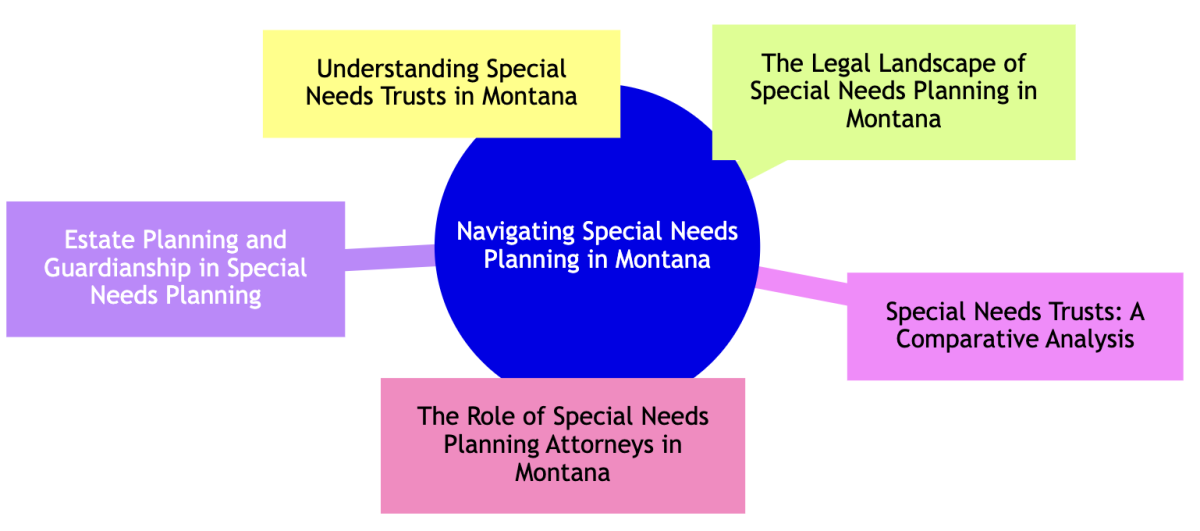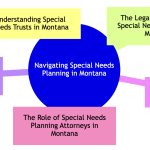Special needs planning in Montana is a critical process for families and individuals caring for loved ones with disabilities. It involves legal and financial arrangements designed to ensure the well-being and security of those with special needs. In Montana, where state-specific laws intertwine with federal regulations, understanding the nuances of special needs planning is essential. This article aims to provide comprehensive insights into creating a secure future for Montanans with special needs.
Key Takeaways:
- Special needs planning in Montana involves creating legal structures to protect individuals with disabilities.
- It's essential for maintaining eligibility for government benefits while ensuring long-term financial security.
- Special Needs Trusts (SNTs) are central to this planning, offering a range of options to fit individual needs.

Understanding Special Needs Trusts in Montana
Special Needs Trusts (SNTs) in Montana are designed to benefit individuals with disabilities without jeopardizing their eligibility for government assistance programs like Medicaid and Supplemental Security Income (SSI). These trusts manage assets for the beneficiary's needs, supplementing but not replacing government benefits.
Types of Special Needs Trusts in Montana:
|
Type of Trust |
Purpose |
Benefits |
|
First-Party SNT |
Holds assets belonging to the beneficiary, like an inheritance or settlement. |
Protects eligibility for government benefits while using the beneficiary's assets for their care. |
|
Third-Party SNT |
Set up by someone other than the beneficiary, usually a family member. |
Provides financial support without affecting the beneficiary's eligibility for public benefits. |
|
Pooled Trust |
Managed by a non-profit organization, combining resources from multiple beneficiaries. |
Offers professional trust management and shared costs, ideal for smaller estates. |
The Legal Landscape of Special Needs Planning in Montana
Navigating the legal landscape of special needs planning in Montana requires an understanding of both state and federal laws. Montana's specific statutes and regulations can significantly impact the setup and administration of Special Needs Trusts. These state laws are designed to work in harmony with federal guidelines, particularly those governing eligibility for government assistance programs.
State-specific regulations in Montana may offer unique provisions, especially concerning the establishment and management of Special Needs Trusts. These provisions ensure that the trusts are set up in a way that aligns with both state and federal requirements, safeguarding the beneficiary's eligibility for essential programs like Medicaid and Supplemental Security Income (SSI).
At the federal level, laws primarily dictate how trusts interact with government benefits. These regulations are crucial in ensuring that the assets held in a Special Needs Trust do not disqualify the beneficiary from receiving their much-needed government assistance. Understanding this interplay between state and federal laws is vital for anyone involved in special needs planning in Montana, ensuring that all legal requirements are met while serving the best interests of the individual with special needs.
Key Components of a Special Needs Trust
A Special Needs Trust in Montana must be carefully structured to ensure it meets legal requirements and serves the beneficiary's best interests.
Essential Elements of a Special Needs Trust:
- Beneficiary Designation: Identifies the individual with special needs who will benefit from the trust.
- Trustee Role: Outlines the responsibilities of the trustee, who manages the trust assets and makes distributions on behalf of the beneficiary.
- Terms and Conditions: Specifies the conditions under which the trust operates, including how funds can be used and what happens to remaining assets after the beneficiary's death.
Incorporating these elements effectively requires a deep understanding of both the beneficiary's needs and the legal landscape of special needs planning in Montana.
Estate Planning and Guardianship in Special Needs Planning
Estate planning for individuals with special needs is a meticulous process that ensures their long-term welfare and financial security. This planning typically includes setting up a Special Needs Trust, a legal tool designed to provide financial support without compromising the individual's eligibility for government benefits like Medicaid and Supplemental Security Income (SSI).
A Special Needs Trust in estate planning involves several critical steps:
- Creating the Trust: This involves drafting a trust document that specifies how the trust's assets will be managed and used for the beneficiary's benefit. The trust must be structured to ensure it does not disqualify the beneficiary from receiving essential government benefits.
- Selecting a Trustee: Choosing a trustee is a significant decision. The trustee is responsible for managing the trust's assets and making distributions for the benefit of the person with special needs. The right trustee should be knowledgeable about Montana's special needs laws and compassionate towards the beneficiary's situation.
- Guardianship Considerations: For individuals with special needs who may not be able to make their own legal or medical decisions, establishing guardianship is a crucial aspect of estate planning. A legal guardian can make important decisions on behalf of the individual, ensuring their best interests are always prioritized.
Special Needs Trusts: A Comparative Analysis
In Montana, there are different types of Special Needs Trusts, each serving unique purposes based on the beneficiary's circumstances.
- Revocable vs. Irrevocable Trusts: Revocable trusts offer flexibility as they can be altered or terminated by the grantor. However, they might not provide the same level of protection for government benefits as irrevocable trusts, which cannot be changed once established.
- First-Party vs. Third-Party Trusts: First-party trusts are funded with the beneficiary's assets, often received from an inheritance, settlement, or personal savings. In contrast, third-party trusts are established and funded by someone other than the beneficiary, typically a family member. The choice between these trusts depends on the source of funding and the specific needs of the beneficiary.
Understanding these differences is crucial for families and individuals in Montana as they navigate the best options for special needs planning.
The Role of Special Needs Planning Attorneys in Montana
Special needs planning in Montana often requires the guidance of experienced attorneys who specialize in this area of law. These legal professionals provide invaluable assistance in navigating the complexities of setting up and managing Special Needs Trusts. They ensure that all legal requirements are met and that the trust is structured to best serve the beneficiary's interests.
Special needs attorneys in Montana also play a vital role in advising on guardianship matters. They help families understand the legal implications and responsibilities of becoming a guardian for a loved one with special needs. Their expertise is crucial in making informed decisions that align with the best interests of the individual with special needs.
Conclusion: Securing a Brighter Future with Special Needs Planning
Special needs planning in Montana is a vital process that requires careful consideration of both state and federal laws. By understanding the intricacies of Special Needs Trusts and the legal landscape, families and caregivers can create a secure and stable future for their loved ones with special needs. This planning ensures that individuals with disabilities receive the care and support they need while preserving their eligibility for crucial government benefits.
Navigating this complex area of law can be challenging, but it's essential for protecting the rights and well-being of some of the most vulnerable members of our community. For those seeking guidance and expertise in this field, Montana Elder Law offers a wealth of knowledge and experience. Their dedicated team is committed to providing compassionate and comprehensive legal services, ensuring that every special needs plan is tailored to meet the unique needs of each individual and family in Montana.
With the right planning and support, individuals with special needs can enjoy a fulfilling life, and their families can have peace of mind knowing that their loved ones are well cared for. Montana Elder Law stands ready to assist in navigating these important decisions, helping to secure a brighter future for Montanans with special needs.





